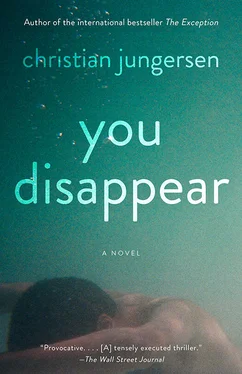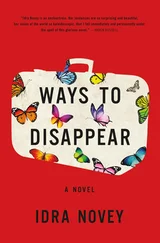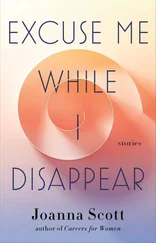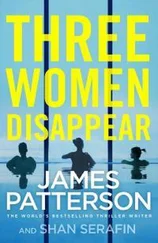• • •
In the bright dining room of the guesthouse, each regular has her own white linen napkin and napkin ring, waiting for her at her assigned place at one of the small tables. Everything’s just as it has been for half a century, with guests who return gratefully year after year.
Bernard places his cell phone and our room keys on the starched white cotton tablecloth, and then we walk over to the buffet.
The guesthouse was furnished many years ago by the family who lived in this stately manor, just a hundred yards from the beach and even closer to the woods. They’ve let their old mahogany furniture remain in the rooms and the family pictures on the walls. Over time, the manor and the grounds have only grown more idyllic, though the guests are older now. Around us are several well-dressed women in their seventies and eighties, each seated at her own table with an empty place across from her.
Soon I’m back from the buffet with a bowl of oatmeal topped with stewed apples and cinnamon, evidently a traditional breakfast in Sweden. Bernard walks leisurely around the long table, pondering the eggs, the bacon, the cheese and fruit. He wakes in stages, I now know. And when in a little while the young woman asks me what we’d like to drink, I also know I should order him a double espresso.
While he’s up there, I hold his cell in my hand, feeling its smooth backside against my palm, a bit like skin. Suddenly the display lights up: Winnie calling , it says, and without thinking I press the END CALL button before the phone manages to ring.
This holiday mustn’t end early. But it’s about to — or in any case, its unspoiled happiness is. For Bernard’s mother-in-law wouldn’t call without a reason — and the reason must have something to do with Lærke. I feel the urge to cry. An icon on the cell display indicates that there’s been a call, and a moment later another icon appears, to show that a message has been left. Can I erase the message and remove the icon? These are the last good minutes of our vacation. Of a vacation I never thought I’d take.
Bernard lumbers back to the table in his one-quarter-asleep gait with fruit, two croissants, and a little Nutella on his plate. I want to drink him in. To inhale him like air, suck him into my lungs, I want to see every little hair on his face, every little wrinkle, for this is the last I’ll see of him before our vacation ends.
Will he glance down when he grasps the arm of the chair to seat himself? Will he notice his phone and pick it up to see who’s called?
No, he only looks at me. And smiles broadly.
“Thank you for last night,” I say.
“I think it’s me who should be thanking you.”
We both laugh.
Yesterday morning, we studied all the widows at the breakfast tables around us and imagined their lives. Some were excessively erect of posture while others were hunched over, but they all radiated a certain dignity in their fine summer dresses, pressed and pastel.
Every summer for forty years, we agreed, they’ve been coming down here from Stockholm — at some point with just their husbands, and before that with their children too, who could play on the grounds. As each man died, his widow had to consider carefully: should she lay this little paradise with him in the grave, this preserved essence of their summers’ happiness during the ’60s and ’70s? In the end, however, each widow insisted on her freedom and her right to go on living life on her own, and she kept making the trip.
But even though each return has been a declaration of independence, a loud exclamation to herself and the world at large that she still has a life to live, yet each summer’s visit, each napkin ring lying in the same spot in the dining room, becomes a shadow dance with a man who had once been warm and muscular and laughed when he came home from work, who chewed her out or ignored her or pressed himself into her during sleep. A man who is now dead and gone. And each sunken widow’s face moves about this bright dining room as a memorial tablet testifying to a love that extends beyond death.
The love that Bernard and I share is another sort. We’ve smuggled our deceit into their temple, and I imagine that if the pastel widow ladies discovered our infidelity, right here in the midst of their shrine, they would band together, hang us naked from the fruit trees out on the grounds of the estate, and flay us alive with their old women’s claws.
Is he looking down at the phone now? How can I divert his attention? If I try to move it away, it’ll only increase the risk of him looking.
Our last good minutes, our very last good minutes; I take him by the hand. He gazes into my eyes, I gaze into his and I say, “Thank you for a wonderful holiday.”
“And it isn’t even over yet,” he says.
I’m not a good person. When I listen to what Bernard has been through for his darling — with his respect for her undiminished, and a love that the widows here would admire — I know I haven’t deserved him. He’s denied it many times when I mention it, and I enjoy hearing his repeated denials, but I know that they don’t really hold water. I know that he still doesn’t know me, that I haven’t told him everything. For instance I haven’t told him about the night when Niklas found me on the kitchen floor, passed out from drinking.
Is he glancing at the phone now? If I’m lucky, I’ve got three minutes left. I want to swallow them whole — to suck them into my grasping, guilty soul, which laps up egotistical pleasures and neglects my son and husband while stealing a sick woman’s future.
“What’s up?” he asks. He’s remarkably good at noticing if I’m not fully present.
“I’m just thinking about that painting in the parlor.”
“She has a dreamy expression, doesn’t she?”
The painting he refers to is hardly the largest in the room, but he’s absolutely right: That’s the picture that’s made the biggest impact on me. He’s been figuring me out.
He asks, “Do you think it might portray the grandmother of one of the women who looks after the place now?”
“Well, some of the things aren’t original. They must have been bought for the place later.”
He says, “The napkin ring here …”
Don’t look down! Don’t look down! I lift up the ring, away from its position by the side of his phone. “Oh yes,” I say, unnecessarily holding it up to the light. “I do like it.”
“But it was definitely a recent purchase.”
That’s it: nothing! We’ll talk about absolutely nothing at all. Denmark and the rest of the outside world can just vanish. I will make love to him, I’ll dunk him in the waters of the Kattegat and raise him up again, I’ll bike with him down from Halland Ridge with the air blowing into our cuffs and puffing out our sleeves.
“There must be someplace up on the ridge where we could lie down, just you and me,” he says. “Just like yesterday. You know — off the beaten track.”
He spreads Nutella on one of the croissants and glances down.
“Somebody called.”
Frederik and I are watching a Danish crime show. It’s a rerun, and if I’d cared enough to remember when I saw it the first time, I’d know right now who the killer was.
Frederik made dinner tonight. He set candles out on the table, he asked about the seminar and wanted to hear all about the other participants and what we learned. He spoke affectionately to me all day; leaned over the table toward me and looked me in the eye. I know what he’s up to — he’s told me more than once. After all, we’re still man and wife , he says. We need to make it work again .
Now he’s set the coffee on the coffee table in front of the TV, along with our half-drained glasses of red wine. He scoots closer to me on the couch so that our thighs nearly touch.
Читать дальше



![Ally Carter - [Gallagher Girls 01] I'd Tell You I Love You But Then I'd Have to Kill You](/books/262179/ally-carter-gallagher-girls-01-i-d-tell-you-i-lo-thumb.webp)








